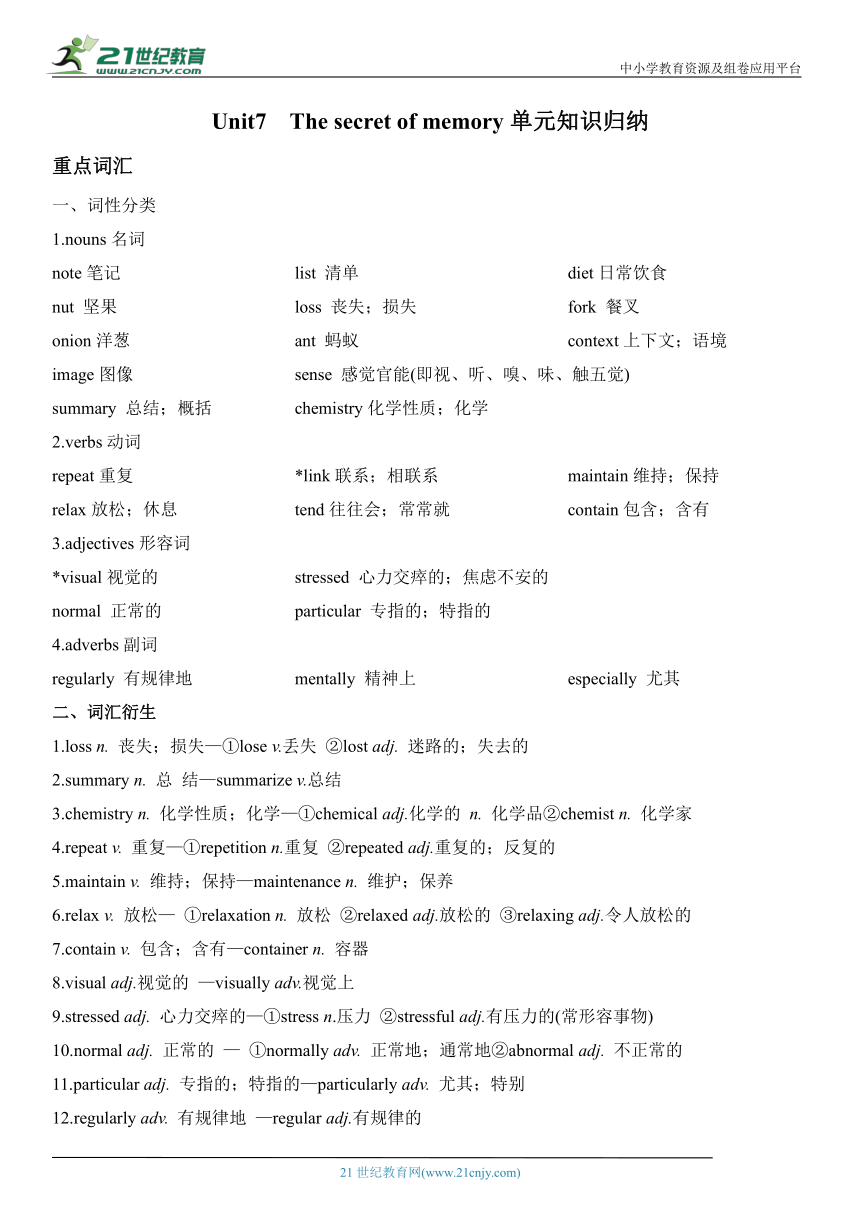Unit7 The secret of memory必备知识点讲义(沪教版英语2024新版8年级上册)
文档属性
| 名称 | Unit7 The secret of memory必备知识点讲义(沪教版英语2024新版8年级上册) |  | |
| 格式 | docx | ||
| 文件大小 | 149.8KB | ||
| 资源类型 | 试卷 | ||
| 版本资源 | 沪教版 | ||
| 科目 | 英语 | ||
| 更新时间 | 2025-07-19 23:16:16 | ||
图片预览

文档简介
中小学教育资源及组卷应用平台
Unit7 The secret of memory单元知识归纳
重点词汇
一、词性分类
1.nouns名词
note笔记 list 清单 diet日常饮食
nut 坚果 loss 丧失;损失 fork 餐叉
onion洋葱 ant 蚂蚁 context上下文;语境
image图像 sense 感觉官能(即视、听、嗅、味、触五觉)
summary 总结;概括 chemistry化学性质;化学
2.verbs动词
repeat重复 *link联系;相联系 maintain维持;保持
relax放松;休息 tend往往会;常常就 contain包含;含有
3.adjectives形容词
*visual视觉的 stressed 心力交瘁的;焦虑不安的
normal 正常的 particular 专指的;特指的
4.adverbs副词
regularly 有规律地 mentally 精神上 especially 尤其
二、词汇衍生
1.loss n. 丧失;损失—①lose v.丢失 ②lost adj. 迷路的;失去的
2.summary n. 总 结—summarize v.总结
3.chemistry n. 化学性质;化学—①chemical adj.化学的 n. 化学品②chemist n. 化学家
4.repeat v. 重复—①repetition n.重复 ②repeated adj.重复的;反复的
5.maintain v. 维持;保持—maintenance n. 维护;保养
6.relax v. 放松— ①relaxation n. 放松 ②relaxed adj.放松的 ③relaxing adj.令人放松的
7.contain v. 包含;含有—container n. 容器
8.visual adj.视觉的 —visually adv.视觉上
9.stressed adj. 心力交瘁的—①stress n.压力 ②stressful adj.有压力的(常形容事物)
10.normal adj. 正常的 — ①normally adv. 正常地;通常地②abnormal adj. 不正常的
11.particular adj. 专指的;特指的—particularly adv. 尤其;特别
12.regularly adv. 有规律地 —regular adj.有规律的
13.mentally adv. 精神上 — mental adj.精神的;心理的
三、一词多词性
1.note n. 笔记 v. 注意;留意 2. sense n.感觉官能 v.感觉到;意识到
3.link v. 联系;相联系 n.联系;关系 4.list n. 清单 v. 列清单
重点短语
1.play an important role in在……中扮演重要角色
2.make a point of doing sth. (因重要或必要)保证做
3.memory linking 记忆关联 4.make up a story编一个故事
5.what's more 此外 6.as well as 和;以及;还有
7.last but not least 最后但同样重要的 8.take time to 花时间做……
9.tend to 往往会;趋向于 10.make time to do sth. 安排时间做某事
11.natural disaster自然灾害 12.figure out 弄懂;弄清楚
核心句式
1.Your memory plays an important role in your life. 你的记忆在你的生活中扮演着重要的角色。
2.It's helpful to live a mentally active life. 过一种精神活跃的生活是有益的。
3.Make a point of trying new things. 重视尝试新事物。
4.Everyone has moments of forgetfulness and memory tends to decline with age.
每个人都有健忘的时候,随着年龄增长,记忆力会逐渐衰退。
5.It's quite normal for people to experience memory loss as they get older.
随着年龄的增长,人们经历记忆力减退是很正常的。
核心语法
A if引导的条件状语从句
1. 含义及用法
if 意为“如果”,表示一种假设情况,引导的从句提出条件,主句说明在该条件下产生的结果。
If it rains tomorrow, we will stay at home.如果明天下雨,我们就待在家里。
if引导的条件状语从句既可以放在主句前,也可以放在主句后。当从句在前时,从句和主句之间要用逗号隔开,主句在前时无需用逗号隔开。
We will go camping if the weather is fine.天气好的话,我们就去露营。
2. 时态规则
· 主将从现:在含有 if引导的条件状语从句的复合句中,如果主句是一般将来时,从句要用一般现在时表示将来,表达可能发生的情况。
He will come to see you if he has time.如果他有时间,他会来看你。
· 主情从现:当主句中含有情态动词时,从句用一般现在时。
You can pass the exam if you study hard.如果你努力学习,你就能通过考试。
· 主祈从现:主句是祈使句时,从句用一般现在时。
Don't forget to bring an umbrella if it rains.如果下雨,别忘了带伞。
· 主从同现:若主句和从句描述的都是客观事实、真理等,主句和从句都用一般现在时。
If you heat ice, it turns into water.如果加热冰,冰就会变成水。
B if...not和unless引导的条件状语从句
1. 含义及用法
unless意为“除非;如果不”,相当于if...not,引导的从句也是表示条件,主句表示在该条件下的结果。
You won't pass the test unless you work hard. =You won't pass the test if you don't work hard.
如果你不努力学习,你就不会通过考试。
unless引导的从句同样可前可后,前置时需用逗号与主句隔开。
Unless you invite him, he won't come to your party. 除非你邀请他,否则他不会来参加你的派对。
2. 时态规则
与 if引导的条件状语从句类似,遵循“主将从现”“主情从现”“主祈从现”等规则。
· 主将从现:She will be late unless she gets up early.如果她不早起,就会迟到。
· 主情从现:You must listen carefully in class unless you want to fall behind.你 必须在课堂上认真听讲,除非你想落后。
· 主祈从现:Don't go out unless you finish your homework. 除非你完成作业,否则别出去。
两者区别:if 引导的是一种肯定的条件假设;而unless 引导的是否定意义的条件假设,更强调“如果没有……条件,就会……”。
有些情况下,if...not和unless可以互换,但在强调条件的唯一性或语气较强时,通常用unless。
I won't forgive you unless you apologize. (这里用unless强调只有道歉才会原谅, 语气更强。)
21世纪教育网 www.21cnjy.com 精品试卷·第 2 页 (共 2 页)
21世纪教育网(www.21cnjy.com)
Unit7 The secret of memory单元知识归纳
重点词汇
一、词性分类
1.nouns名词
note笔记 list 清单 diet日常饮食
nut 坚果 loss 丧失;损失 fork 餐叉
onion洋葱 ant 蚂蚁 context上下文;语境
image图像 sense 感觉官能(即视、听、嗅、味、触五觉)
summary 总结;概括 chemistry化学性质;化学
2.verbs动词
repeat重复 *link联系;相联系 maintain维持;保持
relax放松;休息 tend往往会;常常就 contain包含;含有
3.adjectives形容词
*visual视觉的 stressed 心力交瘁的;焦虑不安的
normal 正常的 particular 专指的;特指的
4.adverbs副词
regularly 有规律地 mentally 精神上 especially 尤其
二、词汇衍生
1.loss n. 丧失;损失—①lose v.丢失 ②lost adj. 迷路的;失去的
2.summary n. 总 结—summarize v.总结
3.chemistry n. 化学性质;化学—①chemical adj.化学的 n. 化学品②chemist n. 化学家
4.repeat v. 重复—①repetition n.重复 ②repeated adj.重复的;反复的
5.maintain v. 维持;保持—maintenance n. 维护;保养
6.relax v. 放松— ①relaxation n. 放松 ②relaxed adj.放松的 ③relaxing adj.令人放松的
7.contain v. 包含;含有—container n. 容器
8.visual adj.视觉的 —visually adv.视觉上
9.stressed adj. 心力交瘁的—①stress n.压力 ②stressful adj.有压力的(常形容事物)
10.normal adj. 正常的 — ①normally adv. 正常地;通常地②abnormal adj. 不正常的
11.particular adj. 专指的;特指的—particularly adv. 尤其;特别
12.regularly adv. 有规律地 —regular adj.有规律的
13.mentally adv. 精神上 — mental adj.精神的;心理的
三、一词多词性
1.note n. 笔记 v. 注意;留意 2. sense n.感觉官能 v.感觉到;意识到
3.link v. 联系;相联系 n.联系;关系 4.list n. 清单 v. 列清单
重点短语
1.play an important role in在……中扮演重要角色
2.make a point of doing sth. (因重要或必要)保证做
3.memory linking 记忆关联 4.make up a story编一个故事
5.what's more 此外 6.as well as 和;以及;还有
7.last but not least 最后但同样重要的 8.take time to 花时间做……
9.tend to 往往会;趋向于 10.make time to do sth. 安排时间做某事
11.natural disaster自然灾害 12.figure out 弄懂;弄清楚
核心句式
1.Your memory plays an important role in your life. 你的记忆在你的生活中扮演着重要的角色。
2.It's helpful to live a mentally active life. 过一种精神活跃的生活是有益的。
3.Make a point of trying new things. 重视尝试新事物。
4.Everyone has moments of forgetfulness and memory tends to decline with age.
每个人都有健忘的时候,随着年龄增长,记忆力会逐渐衰退。
5.It's quite normal for people to experience memory loss as they get older.
随着年龄的增长,人们经历记忆力减退是很正常的。
核心语法
A if引导的条件状语从句
1. 含义及用法
if 意为“如果”,表示一种假设情况,引导的从句提出条件,主句说明在该条件下产生的结果。
If it rains tomorrow, we will stay at home.如果明天下雨,我们就待在家里。
if引导的条件状语从句既可以放在主句前,也可以放在主句后。当从句在前时,从句和主句之间要用逗号隔开,主句在前时无需用逗号隔开。
We will go camping if the weather is fine.天气好的话,我们就去露营。
2. 时态规则
· 主将从现:在含有 if引导的条件状语从句的复合句中,如果主句是一般将来时,从句要用一般现在时表示将来,表达可能发生的情况。
He will come to see you if he has time.如果他有时间,他会来看你。
· 主情从现:当主句中含有情态动词时,从句用一般现在时。
You can pass the exam if you study hard.如果你努力学习,你就能通过考试。
· 主祈从现:主句是祈使句时,从句用一般现在时。
Don't forget to bring an umbrella if it rains.如果下雨,别忘了带伞。
· 主从同现:若主句和从句描述的都是客观事实、真理等,主句和从句都用一般现在时。
If you heat ice, it turns into water.如果加热冰,冰就会变成水。
B if...not和unless引导的条件状语从句
1. 含义及用法
unless意为“除非;如果不”,相当于if...not,引导的从句也是表示条件,主句表示在该条件下的结果。
You won't pass the test unless you work hard. =You won't pass the test if you don't work hard.
如果你不努力学习,你就不会通过考试。
unless引导的从句同样可前可后,前置时需用逗号与主句隔开。
Unless you invite him, he won't come to your party. 除非你邀请他,否则他不会来参加你的派对。
2. 时态规则
与 if引导的条件状语从句类似,遵循“主将从现”“主情从现”“主祈从现”等规则。
· 主将从现:She will be late unless she gets up early.如果她不早起,就会迟到。
· 主情从现:You must listen carefully in class unless you want to fall behind.你 必须在课堂上认真听讲,除非你想落后。
· 主祈从现:Don't go out unless you finish your homework. 除非你完成作业,否则别出去。
两者区别:if 引导的是一种肯定的条件假设;而unless 引导的是否定意义的条件假设,更强调“如果没有……条件,就会……”。
有些情况下,if...not和unless可以互换,但在强调条件的唯一性或语气较强时,通常用unless。
I won't forgive you unless you apologize. (这里用unless强调只有道歉才会原谅, 语气更强。)
21世纪教育网 www.21cnjy.com 精品试卷·第 2 页 (共 2 页)
21世纪教育网(www.21cnjy.com)
同课章节目录
